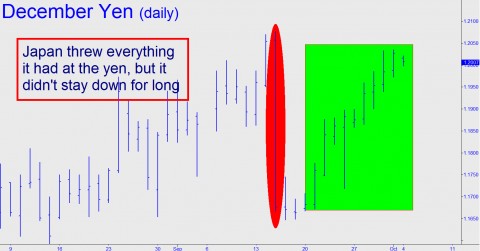With December Gold closing on the $1340 target that we disseminated a while back, it’s time for a fresh perspective. We wouldn’t want readers to get the glum idea that $1340 is as good as we think it’s going to get. Far from it. The way gold and silver have been acting lately, it feels more like bullion prices are just getting off the launching pad. Naturally, there’s no shortage of skeptics who would tell investors to hold off buying until precious metals have corrected some. You’d be wary about diving in yourself if you were a financial advisor who’d kept clients out of gold for the last decade, even as its price has more than quintupled. But we think any investor who is cautious on bullion right now is going to regret it when, come January, prices are at least 10-15% higher.
Can we think of a reason for caution, just for the sake of argument? Not a good one – unless you perhaps believe that the central banks are about to jack up interest rates and smother the world’s tepid economy with a mega dose of austerity. The rationale most often cited these days for being cautious on bullion is that its price has simply been too hot not to cool down. Fair enough. But it is just as reasonable to ask why prices should cool down, given the unprecedented money blowout that is occurring throughout the world. And the word “blowout” is hardly an exaggeration. Japan, its primacy as an exporter on the line, is in a fight-to-the-death to suppress the yen’s value relative to the dollar. But look at the chart above if you want to see how little they’ve accomplished. Although the Bank of Japan’s opening shot on September 15 obviously spooked speculators, causing the yen to suffer its biggest one-day loss in years, nearly all of the downdraft (in red) has been recouped since.
Smoot Hawley II
And guess who has become the world’s most aggressive buyer of yen of late: the Chinese. After all, why would they sit idly by as a cutthroat competitor tries to rev up exports by manipulating its currency. China has been accused repeatedly by the U.S. of doing the same thing, but it seems doubtful that America will get the Chinese to back down. How do you threaten a country that holds nearly a trillion dollars worth of your debt? Enacting punitive new tariffs appears to be the answer, at least in the shallow, economically ignorant minds of our political leaders. But with the experience of the 1930s as precedent, we doubt that Smoot Hawley II will even come to a vote.
Meanwhile, with the dollar now crushing key technical supports with alarming regularity, it would appear that reality has finally turned against the flight-to-“safety” story that had captivated institutional money managers, if no one else. Under the circumstances, bullion investors would be wise to act aggressively. If there are good arguments for restraint at this time, we have yet to hear them.
(If you’d like to have Rick’s Picks commentary delivered free each day to your e-mail box, click here.)


Let China buy land in Fee “Fee Simple Absolute”, and then raise the fee (fee = fife feod feud, feudal tenanture, peon, serf, slave). Only problem is that Americans may find out the truth about their own indenture, and loss of inheritance to the Lord of Lands; STATE OF__________(fill the blank)